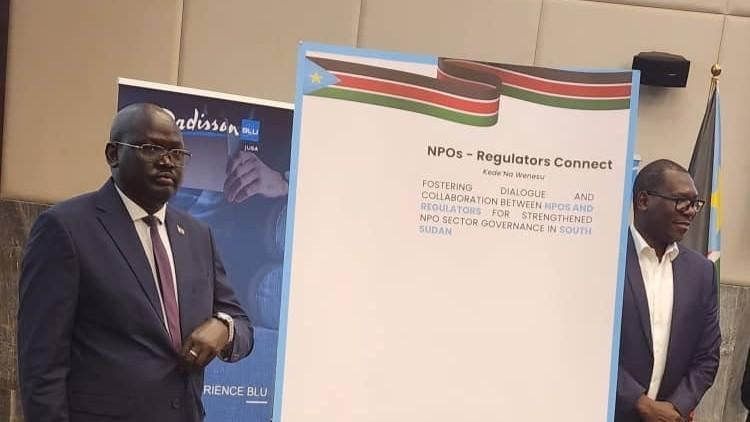Africa-Press – South-Sudan. The Financial Intelligence Unit (FIU) of South Sudan, in collaboration with the Relief and Rehabilitation Commission (RRC) and the Civic Advisory Hub (CAH), has launched a three-day NGO Regulators Connect Dialogue to enhance awareness of the risks associated with the misuse of the non-profit sector for terrorist financing and related criminal activities.
Held under the theme “Protecting NGOs from Money Laundering and Terrorist Financing,” the dialogue brought together regulators, non-profit organisations (NPOs), and subject matter experts to strengthen the country’s defences against financial crimes.
The Liaison Advisor of the South Sudan NGO Forum, Seme Wani, raised concerns that reduced donor funding — including cuts introduced during the Trump administration — may increase the risk of money laundering, leaving the country more vulnerable.
Rembe also called for more balanced regulatory frameworks that protect against criminal exploitation without disrupting legitimate humanitarian work.
“We are aware of the unintended consequences that overly broad or de-risking policies can have on legitimate humanitarian operations. Workshops like this help ensure that every dollar we receive can continue supporting those in need,” he said.
Chairperson of the Relief and Rehabilitation Commission, Kueth Gach, emphasised the importance of the initiative in promoting cooperation between NGOs and financial oversight bodies.
“Non-profit organisations, driven by goodwill and purpose, face increasing risks of being exploited for financial crimes, including money laundering and terrorist financing. While NGOs are not traditionally regulated like financial institutions, they are not exempt from responsibility in protecting the integrity of the sector,” he said.
Gach identified key vulnerabilities in the NGO sector, including weak oversight, limited financial transparency, and complex international transactions—factors that create entry points for financial crimes.
To address these challenges, he stressed the need for stronger laws, improved registration systems, due diligence requirements, and closer collaboration between government and NGOs—particularly those working in high-risk areas or across borders.
Director General of the Civic Advisory Hub, Wanjula Yona, noted that the dialogue platform is designed to build bridges between financial crime experts, civil society, and the private sector.
“This product we are launching is geared toward promoting trust, fostering dialogue, and cultivating a spirit of collaboration for the betterment of our nation,” he said.
Yona urged the government to remain vigilant to minimise the country’s exposure to terrorist financing risks.
The Civic Advisory Hub reaffirmed its commitment to supporting the successful implementation of the NGO Regulators Connect initiative in South Sudan by providing technical support and building risk awareness capacity among NGOs.
For More News And Analysis About South-Sudan Follow Africa-Press






